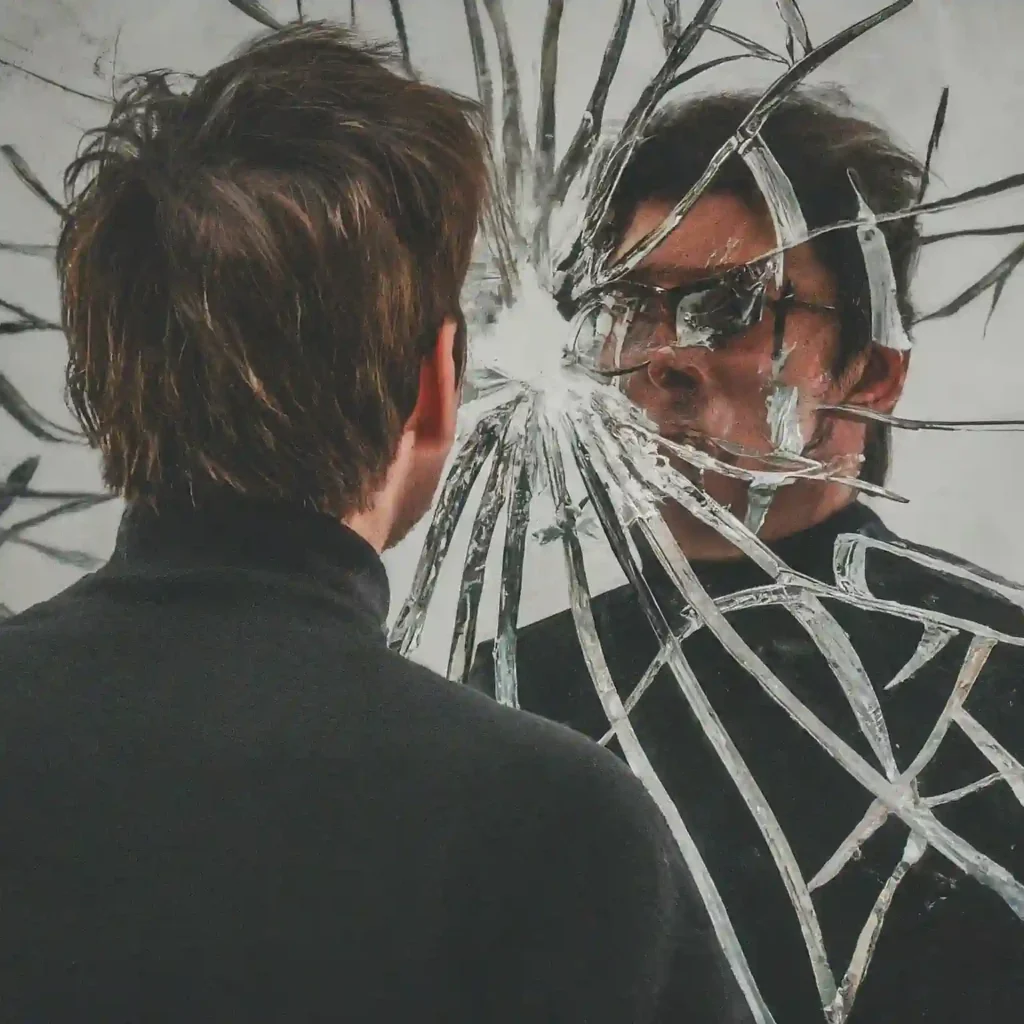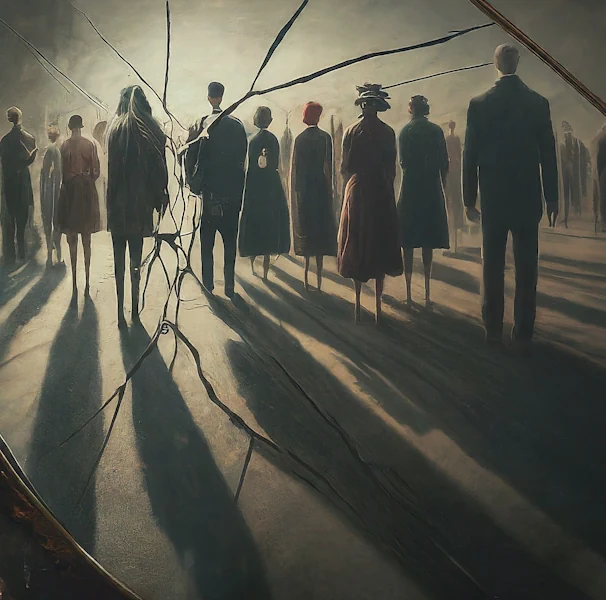“We despise the traits that we see in others that remind us of ourselves.”
So, the quote that I have written above has inspired me to write this blog. Before getting into the deep meaning behind the quote, let me share where I came across it. As I was casually watching a random video on YouTube, a video suggestion popped up featuring an old WWE wrestler. If you were a fan of WWE around 2004-2005, you might remember Muhammad Hassan, a wrestler who evoked strong emotions due to his altercation with the Undertaker. I’ll discuss this incident in my upcoming WWE blog.
Anyway, in this particular video clip, Muhammad Hassan, whose real name is Marc Julian Copani and who is actually of Italian descent rather than Saudi, was speaking. Contrary to his on-screen persona, he said this quote in that YouTube interview. It left me amazed because some people possess the unique ability to arrange words in a truly magical way, conveying profound thoughts in just a few concise sentences. I am not sure if it is his original quote or not.

Reflections of Our Traits: The Paradox of Disliking What Resembles Us
Now that I’ve shared the back story about this quote let’s look into the meaning of this quote and explore its significance.

Our personality is filled with virtues and vices.
Image created by Gemini
No matter who you are or where you live, it is highly likely that you possess a combination of virtues and vices. While most of us are not fond of our vices, there are individuals who proudly display them. Personally, I consider such people to be ignorant, lacking a fundamental understanding of what is morally right and wrong. Some common vices include littering, using abusive language in public or private settings, and engaging in habits like drinking and smoking.
For many of us, our vices may remain concealed or intentionally ignored in order to avoid feelings of self-condemnation. However, let’s imagine a situation where you hold a strong dislike for a particular person. You harbor deep disdain for them, but to your dismay, you discover that they possess the exact same vices as you do. Suddenly, you find yourself comparing your own actions to theirs, experiencing a sense of embarrassment. Self-criticism takes hold, as you question how you could share similar traits with someone you despise so greatly.

Mask of virtue and vice
Image created by Gemini
Indeed, each of us harbors both virtues and vices within our personalities. When we act in benevolent and commendable ways, we adorn ourselves with the mask of virtue, radiating goodness and positivity. However, when our actions take a negative turn, we reluctantly don the mask of vice, which we often try to evade or ignore.
Yet, there are moments when the mirror of truth reflects our true selves, presenting us with the stark reality of our actions. Instead of confronting the vices within us, we sometimes find ourselves disliking the mirror for daring to reveal what we strive to conceal or deny. It is a complex interplay between acceptance and denial, where the mirror serves as a symbol of truth, challenging us to acknowledge and reconcile with our inner contradictions.
Let me tell you about something that happened to me in school. There was this girl who did something that bothered me, and I didn’t like her because of it. Then one day, I found out she really liked Eminem, whose music I used to enjoy. Suddenly, I started to wonder if I should still listen to Eminem’s music. Eventually, I stopped listening to him altogether. It wasn’t that I suddenly didn’t like his music anymore. It was more that I couldn’t stand the thought of having something in common with someone I didn’t like very much.
I think this is the reason why sometimes we don’t even mind the bad behavior of others because we admire the person (lover or partner) so much that we consider them an extension of ourselves. No matter how bad we are, we can’t hate ourselves unless there is some realization which opens our eyes about our vices, such as laziness or smoking, etc.
The two above-mentioned examples taught us how our views about someone’s traits or interests can mix with our feelings toward them. Sometimes, if we dislike a person, we might also dislike the things they like, even if those things aren’t necessarily bad. It’s interesting because it shows how our emotions shape what we like and dislike.
When we observe someone displaying a negative trait that we also possess, especially if we don’t know or aren’t fond of that person, the quote I mentioned earlier rings true. We often feel repelled when we witness someone else exhibiting the same trait. You might even recall instances from your own life where this has happened. These individuals act as mirrors, reflecting back to us traits we possess but dislike. It’s a realization that can be uncomfortable yet insightful, showing us aspects of ourselves we may not have fully acknowledged before.
Why does this paradox of disliking occur? There are several reasons behind this phenomenon:
1. The Emergence of Concealed Flaws: When we notice negative traits in other people, we often realize that we possess the same flaws ourselves. This realization prevents us from passing judgment on others since we are guilty of the very same behavior. As we reflect on these undesirable traits within ourselves, our dislike for them intensifies.

The person observes flaws within themselves that they strongly dislike.
Image created by Gemini
2. The Perils of Comparison: Once we observe a negative trait in someone else, we tend to compare ourselves to them. The fact that we share this trait leads to feelings of displeasure, as nobody enjoys being compared to someone they do not respect or admire. This comparison exacerbates our disdain for the traits we possess.
3. Confronting Our Uniqueness Illusion: We all have a tendency to believe that we are unique, with our own distinct thoughts, tastes, and behaviours. However, when we realize that many others share the same positive and negative traits as us, this illusion of uniqueness shatters. The discovery that we have numerous traits in common with others can be unsettling and may elicit a strong aversion.
This aversion is not solely limited to negative traits or vices. If we strongly dislike or hate a person and subsequently discover that we share something in common with them, we may develop a profound dislike for that particular trait, even if it is not inherently negative. The mere fact of sharing a common trait with someone we despise can be difficult to handle. Let me illustrate this with a clear example: imagine you harbour a deep hatred for the Nazis and Hitler, even though you may not be Jewish or have any personal connection to those who suffered under Nazi Germany. As you delve into the subject and learn more about Hitler, you uncover surprising aspects of his character. For instance, you discover that he was a vegetarian, had a deep love for animals, was a devoted son, a caring husband, and even an artist. Upon realizing these shared traits, you may start despising yourself and drawing comparisons with Hitler because of these commonalities. As a result, you may strive to distance yourself from any similarities in order to avoid any association with Hitler.
What can you do when you find yourself in this situation and how can you healthily reflect on your traits? Here are some suggestions:

Despising the traits or the person is not the right solution to handle this situation.
Image created by Gemini
Once you become aware that you share certain traits with a person you dislike or any other person, it’s natural to feel a sense of unease. The first step is to understand whether the trait or behavior is good, neutral, or bad. If it falls into the good or neutral category, there may be no need to make any changes or despise it. However, if the trait or behavior is negative, it’s time to take action and make some changes in your life to eliminate this negative trait.
Consider this scenario: you possess a negative trait that you notice is also present in highly successful and productive individuals like Elon Musk or Jeff Bezos. In such cases, it would be wise to work on yourself and strive to eliminate this negative trait from your life.
Now, you grasp the profound meaning behind this quote. If you found this blog helpful, I urge you to share it with your family and friends. If you can, then please support our website so that we can continue sharing good content with you.









